
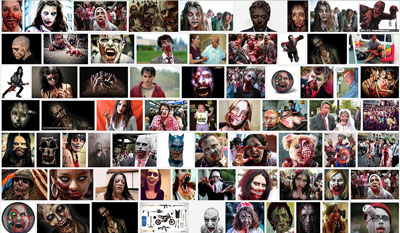
Over the past few years, the zombie apocalypse has come to represent an alternative to neoliberalism – an ideology that admits no alternatives.
"Look at the movies that we see all the time. It's easy to imagine the end of the world – an asteroid destroying all of life and so on – but we cannot imagine the end of capitalism." —
Slavoj Zizek at Occupy Wall Street
I have never considered myself a "zombie guy." Horror isn't my thing, gore bums me out, torture porn isn't my kind of porn. But because of the flood of zombie films over the past 10 years, inertia has been enough to make me into a reluctant expert on the subject – which is not to say that I'm an actual expert, just that I know a lot more about zombies than I ever intended.1
Recently, I flipped from passive consumption – "There's nothing else on"; "It was a long flight"; "Everyone else wanted to watch it"; "It was on Netflix!"; etc. – to being an active consumer. I read Colson Whitehead's 2011 novel
Zone One a couple of years ago and just finished Max Brooks's 2006 oral history
World War Z. So while I still don't consider myself a zombie guy, I can no longer pretend to be a zombie naif. ("Brains?")
More than anything else, these novels convinced me that my time has been well spent, because through them I realized that the political meaning of zombies has shifted from something pat and trite to something more complex. Zombies have become the way we imagine radical revolutionary change. More surprising, the zombie apocalypse is as close as we have come in the past 30-odd years to producing a convincing utopian vision for the future that grows out of our present circumstances. It's important, however, to begin with what zombies used to mean.
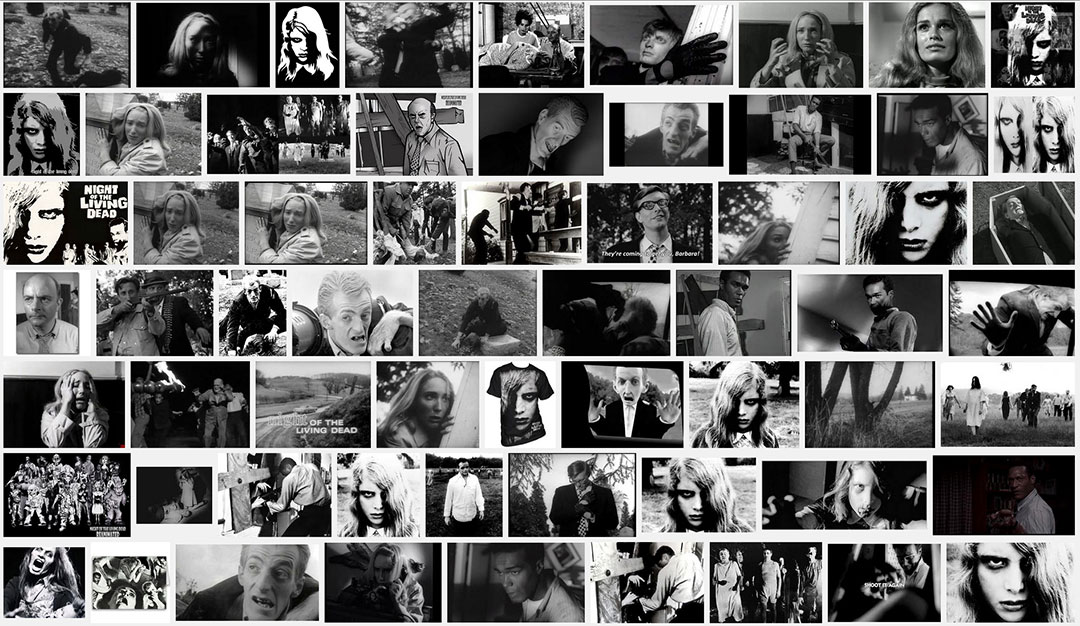
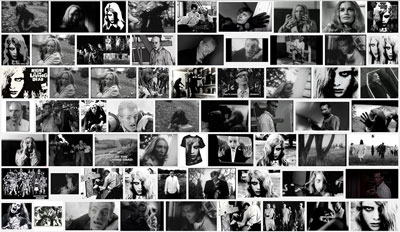
"Night of the Living Dead" Google image search
I first heard what zombies meant in terms of politics sometime back in the mid-'80s, right about the time Margaret Thatcher told the world,
"There is no alternative." I was in high school and hungry for an alternative. I read counter-culture classics like
The Dharma Bums and tertiary tales like
The Electric Kool-Aid Acid Test. I looked to sci-fi like
Stranger in a Strange Land and
Neuromancer, as well as the pseudo-philosophy of
The Fountainhead and
Atlas Shrugged.
I did not look to zombies. To my mind the voodoo drum mesmerism of prewar movies like
White Zombie reflected the xenophobia, fear-mongering and racism of America's apartheid past. I remember my high school friends trying to convince me of the merits the Vietnam-era
Night of the Living Dead, telling me that the film wasn't racist but a comment on racism. I wouldn't take the bait. I lumped George Romero's
now-classic zombie film with the B&W crap that preceded it, and dismissed the more recent R-rated full-color zombie splatter-fests as gory torture porn. I told myself I had more refined tastes.
The monsters I was fascinated with in the 1980s were vampires.2
I remember thinking that my friends' interest in zombies was not just grotesque, it was nostalgic. Zombies were the dregs of a past I wanted nothing to do with. Giving credence to that idea was something I had learned about the meaning of zombies versus vampires: When Republicans are in the White House, Americans tend to fixate on vampires – the idea being that vampires are an expression of an anxiety that was under threat of a parasitic elites. When Democrats are in the White House, zombies loom large; here the idea is that zombies express a fear of the unwashed masses, of mob rule.
That political meaning is an implicit memory. I have no idea when I heard that, who might have told me or in what context I would have learned it, but it was worth remembering because it meant my interest in vampires made me a man of my times. And it's worth mentioning – not because it was wrong or right, but because whether or not zombies ever represented Americans' fear of the unrestrained unwashed, they don't anymore.
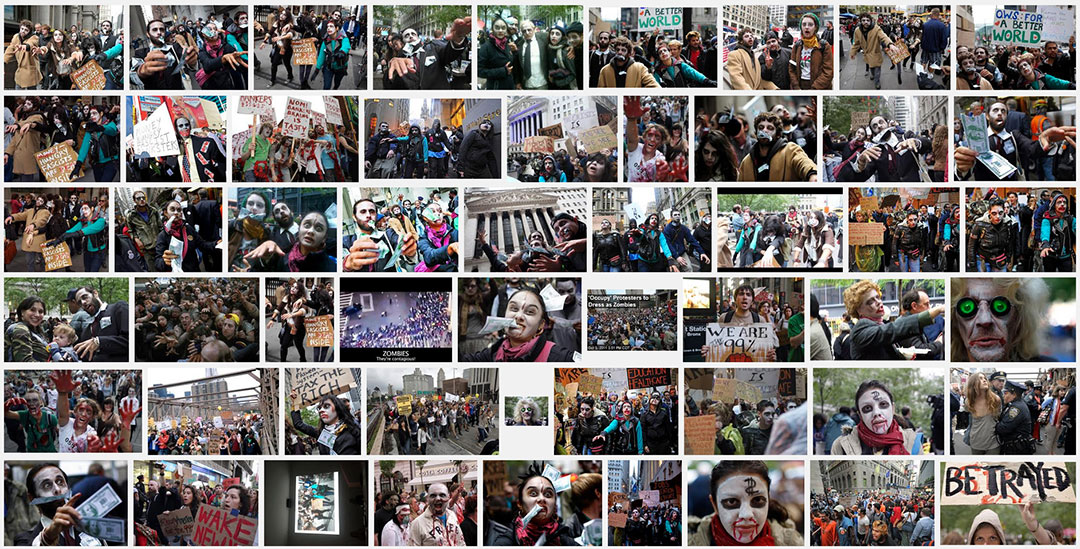
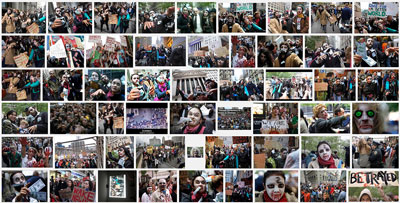
"Occupy Wall Street Zombies" Google image search
Zombies in Revolt
The first time I was cognizant that zombies might no longer mean what I had grown up being told they meant was during the unexpected sight of Occupy Wall Street protesters dressed as zombies taunting the 1%. I was familiar with the phenomenon of
zombie walks – absurdist flash mob street theater – so I wrote the association off to protesters making a pun on "zombie capitalism." But looking back, I no longer think so.
Sometime in the years leading up to September 17, 2011, zombies had gone from being associated with a terror of mob rule to the promise of release from an inescapably all-encompassing system. To be clear: Zombies were not being equated with corporate capitalism – they had become the revolution itself. Zombies had become the alternative to the system with no alternative.
As a movement, Occupy is notoriously hard to pin down. No one person can wholly speak for a movement that is built on the concept of a leaderless, non-hierarchical order. But the anthropologist
David Graeber, who is a self-described anarchist and was an active participant in Occupy Wall Street protests, is someone who can be fairly described as one of the protest movement's intellectual guiding lights, so his ideas are a good place to begin looking for meaning.
Although I have no idea what
zombies mean to Graeber, I have a pretty clear idea what he thinks about capitalism – and although he may be an anarchist, on the subject of capitalism he's no naif. He wrote an entire book on the history of credit, modestly titled,
Debt: The First 5000 Years.
To begin, Graeber is careful to make the distinction between markets, which are ancient; capitalism, which is modern; and the particular strain of capitalism that the Occupiers were protesting, which is even more recent, beginning about the time Danny Boyle and other New Wave zombie guys and gals were coming of age. In his essay,
"A Practical Utopian's Guide to the Coming Collapse," Graeber explains:
The last thirty years has come to be known as the age of neoliberalism – one dominated by a revival of the long-since-abandoned nineteenth-century creed that held that free markets and human freedom in general were ultimately the same thing.
When Joss Whedon made the case for Mitt Romney being the candidate "to put this country back on the path to the zombie apocalypse," he was lampooning the R.O.I. nihilism of Romney's neoliberalism because, for a great many people, acting
"as if return on investment were the only measure of success" is nihilism. As Graeber explains, most of us need to believe in some form of redemptive purpose to give our actions meaning, but capitalism "doesn't work if you have a universal horizon." According to Graeber, the conceptual divide is even wider, because while most of us have a need to believe in a redemptive future, neoliberals need to believe in a looming catastrophe.
Graeber argues that this pessimism is structural; it serves a crucial purpose within capitalism: to stave off over-optimism. He argues that the capitalist game – to buy low and sell high – is a speculative game, but in order for the game to be played, the players need to believe in some sort of looming catastrophe; the function of that catastrophe is to prevent speculation from becoming infinite speculation. (Greaber gives the example of the 2008 global financial collapse as the result of unbridled speculation.)
In other words, capitalism needs an apocalypse.3
To illustrate his point, Graeber uses the example of the 19th-century Chicago industrialists4 who built their mansions along an "incredibly beautiful street."5
They built there, he was told, "because all of the late 19th century capitalists were so convinced that a revolution was going to happen any week and that they were all going to be hanging from trees. So they all relocate to the place where they could easiest evacuate."
The road they built their mansions along led to the closest army base.6
As the threat of a communist revolution faded, Graeber argues a series of plausible and looming catastrophes (nuclear war, ecological collapse, global climate change) have taken over the function of staving off infinite speculation. But, as we all know (again, see the 2008 global financial collapse), those existential threats have not been enough.
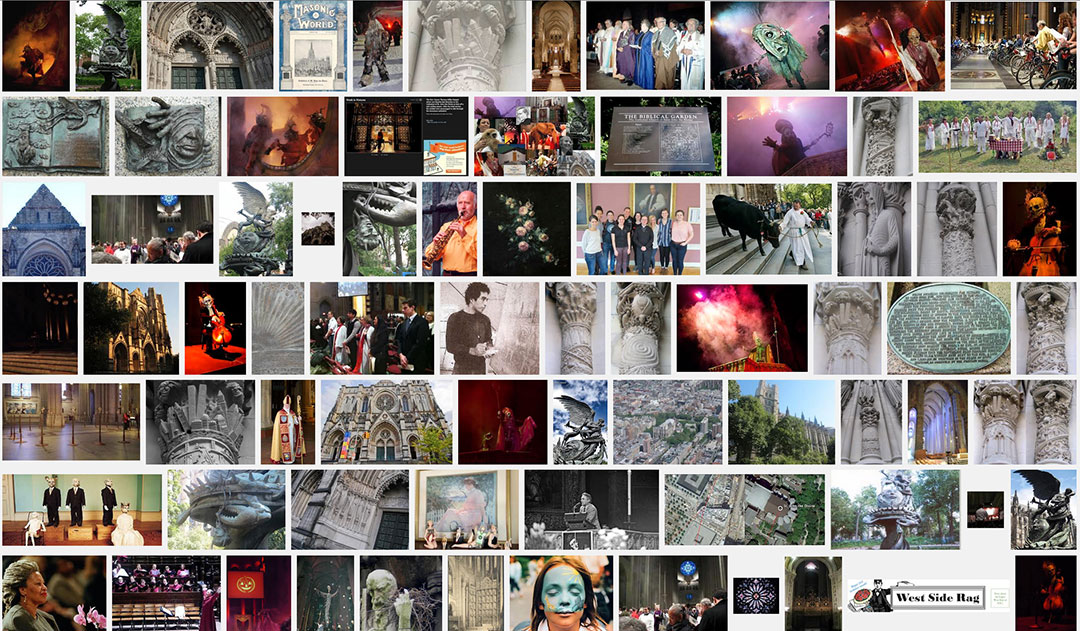
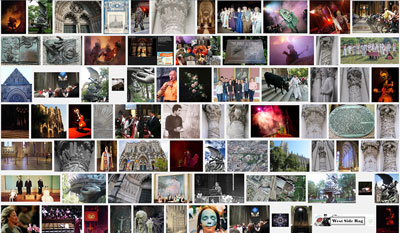
“Cathedral of St. John’s the Divine - demons” Google image search
Zombies in Hollywood
In the 19th century, arcades and factories were the cathedrals of capitalism. In the 20th century, skyscrapers were.7 The cathedrals of the current neoliberal era are blockbuster movies.8
Those who direct, produce and star in these films are the
Abbot Sugers of our age. They attract enormous resources and oversee the overarching symbolic programs those resources are put to.
Traditionally, Medieval sculpture was decorated carvings of demons and souls in torment. The imagery was really graphic (horror fans would be right at home), and there are two different ways to interpret these images of Hell. The first and more conventional reading is that Hell is the stick: The carvings of demons and suffering souls at the entrances of cathedrals were there to warn the illiterate masses to behave.
The second, less conventional reading is that Hell is the carrot. This idea is that the men who would have carved those images would have themselves been illiterate peons and that, rather than illustrating the dangers of damnation to the illiterate masses, what we are looking at are fantasies of revenge. Those Medieval carvings of Hell are remarkable for showing the naked flesh of ladies and lords burned and skewered right next to sinful peasants and bondsmen. As
Jules Michelet explained:
"The medieval peasant would have burst but for his hope in the Devil." Hell is one of the earliest artistic visualization of a democratic justice; zombies are the most recent.
This conceptual divide in interpretations of Medieval sculpture sets the stage for a curious relationship between those who produce Hollywood blockbusters and those who watch them. Hollywood producers belong to the class of speculators who, in order to participate in the system within which they thrive, need to dread catastrophe – but the audiences who pay to see those films have no such need.
For movie audiences, the mainstream, the 99%, catastrophes aren't something to dread; they are something to look forward to. They are a catharsis, a conceptual clearing of the deck. They are the implosion of the banking towers at the end of
Fight Club, they are the destruction of the White House in
Independence Day, they are the wholesale destruction of the entire global map in
2012. While part of the fun can be watching the spectacle of catastrophe itself, it is also what the catastrophe means.
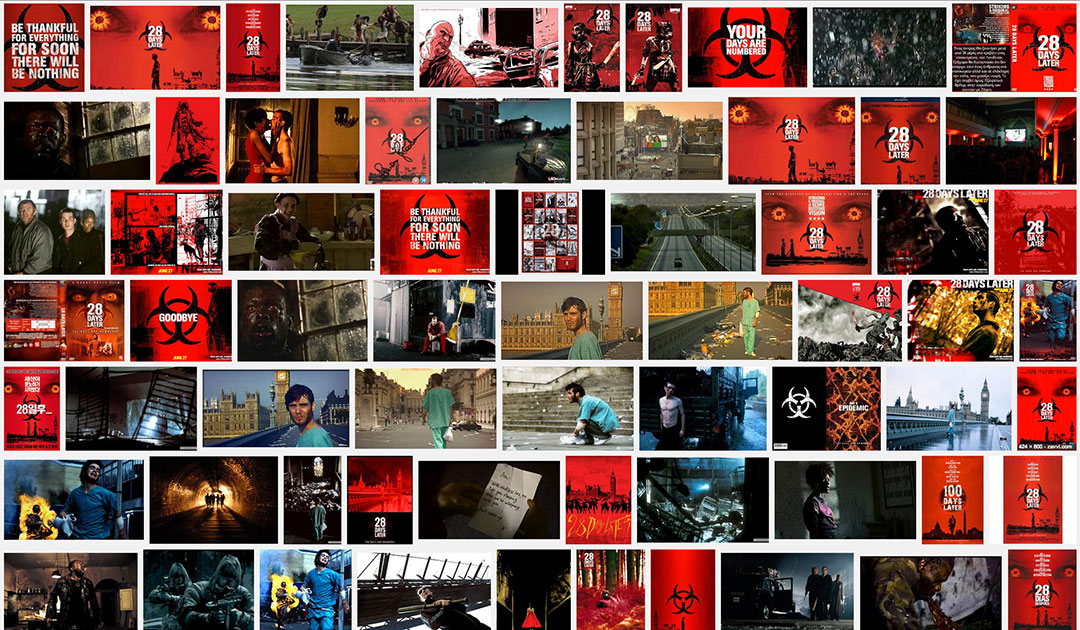
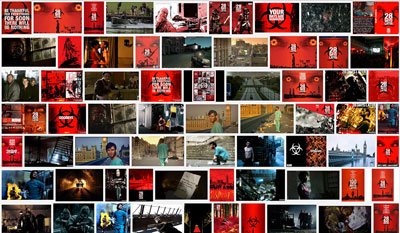
"28 Days Later" Google image search
The joy of premillennial zombie movies was centered around violence, gore, torture and horror, but those films also contained the seed of a New Wave: the utopian image of having the world to yourself. Danny Boyle's great innovation in
28 Days Later was to push the violence, viscera and terror into the background, and to pull the utopia to the fore. He did this by concentrating not on the catastrophe itself, but starting his film in the aftermath. Without the aid of digital technology, Boyle famously showed Cillian Murphy wandering alone through downtown London. (Boyle evidently
used pretty girls to hold lorry drivers out of the shot while filming early in the morning without permits.)
I remember seeing Boyle's film when it came out in theaters. I went to see it, not because it was a zombie movie, but despite that. Everyone I knew was buzzing about the opening scene in London. It was that image that got me and a lot of other "not into zombies" guys and gals to go see
28 Days Later. It was that same image that got people excited to see
I am Legend: It was Manhattan emptied. It was the end of buying and selling. For the majority of us who live within the capitalist system but aren't of the neoliberal breed of capitalist, catastrophe means no more mortgage payments, no cell phone surveillance, never again having to bicker over what is or isn't a preexisting condition. Catastrophe voids all obligation, makes the world anew.
But until now, zombie movies have all been limited catastrophes – the farmhouse or mall standing in for the whole world. These synecdoches have been excuses to show violent gory deaths, opportunities to lambaste the underbelly of human nature. Although both
28 Days Later and
I am Legend depicted a zombie apocalypse on a large scale,
World War Z is the first film that attempts to show zombies as a realistic global catastrophe in its entirety. But unlike the pleasure that Danny Boyle showed the zombie catastrophe aftermath to be, the cathedral builders of
World War Z served us what they thought we wanted: a joyless and pointedly non-revolutionary catastrophe.
(World War Z SPOILER: Big Pharma saves the day.)
The problem for Hollywood may be systemic. Blockbusters like I am Legend and World War Z cost hundreds of millions of dollars to produce, distribute and publicize. That requires the backing of vast amounts of capital – or, more pointedly, the backing of capitalists. Cathedrals, no matter how wily the stone carvers9 or progressive the Abbot Sugars,10 are going to reflect the dominant political attitudes of their society's ruling ideology; for Hollywood blockbusters, that is neoliberalism.
Graeber believes that neoliberalism, judged as a political project, has "succeeded magnificently in convincing the world that capitalism – and not just capitalism, but exactly the financialized, semi-feudal capitalism we happen to have right now – is the only viable economic system." As he sees it, the political project of neoliberalism is to ensure that "under no conditions can alternatives, or anyone proposing alternatives, be seen to experience success."
If Graeber is right, the likelihood of a revolutionary zombie apocalypse blockbuster film is slight. So it may be that representing a zombie catastrophe as the opening onto an alternative world, a world better than today's, is something that can only be pointed to by smaller "indie" films like
28 Days Later or satires like
Zombieland.
And actually imagining a utopia is altogether beyond what any filmmaker could find financing to do.11
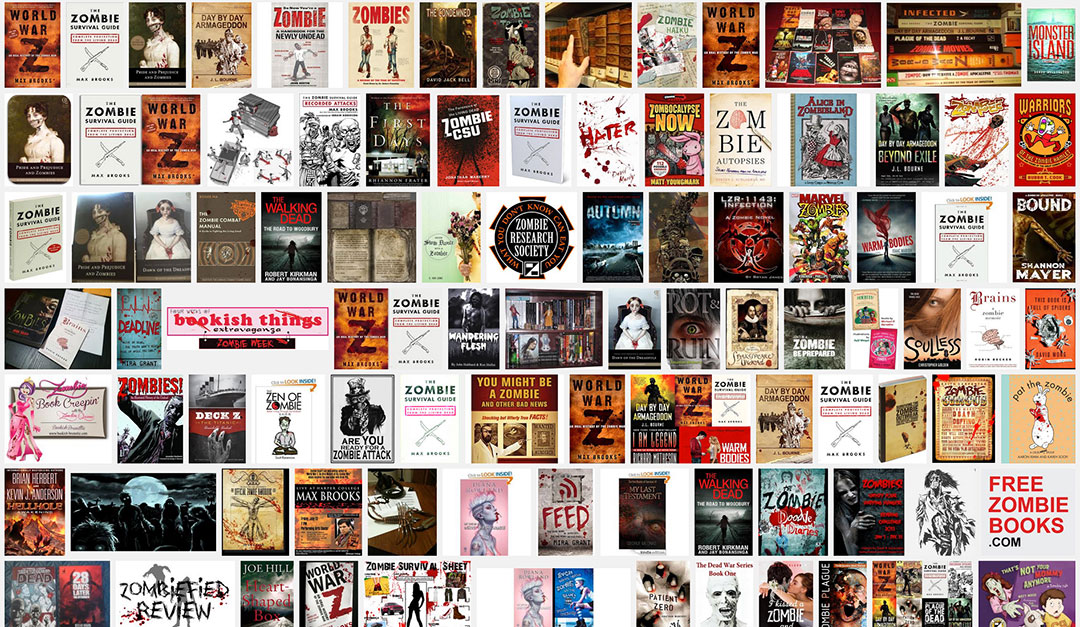
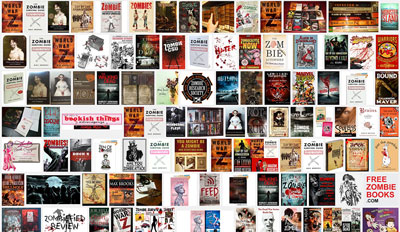
"Zombie books" Google image search
Zombies in Literature
So to understand zombies as revolution, we have to turn away from blockbusters. To understand the zombie protesters marching on Wall Street, we need to look at more than empty streets. For me, it wasn't until I read Colson Whitehead's Zone One that I began to feel the shape what the zombie catastrophe had come to mean, and it wasn't until I finished reading Max Brooks's World War Z that I could name it for what it was. That's not to say Whitehead and Brooks wrote similar stories; their novels couldn't be more different.
Zone One is a zombie dystopia. Some will argue that all zombie stories are dystopias, but that's not what I mean. I mean that Whitehead manages to show us what is good about zombie fantasies by withholding it. "If you want a picture of the future," George Orwell wrote in 1984, "imagine a boot stamping on a human face – forever." If you want to understand Zone One, imagine the corporate shareholders of Timberland collecting their licensing fees on the trademarked sole of that boot every time it stomps on a human face – forever.
Like
28 Days Later, Whitehead skips the catastrophe, but he takes the neoliberal political project to its conclusion. He imagines the capitalists fighting not to save the world, but to save capitalism as the world crumbles. Whitehead's protagonist, Mark Spitz, is surrounded by the material abundance of mass human extinction.
Zone One casts into sharp contrast how important the supermarket scene in
28 Days Later is, along with the montage of mall pillage in
Dawn of the Dead and – in what is possibly the finest moment of all ecstatic wealth destruction in the zombie movie canon – there is the destruction of a Southwestern themed gift shop in
Zombieland. Whitehead's Spitz never has the opportunity to experience anything like that level of anarchic release. Spitz isn't even supposed to break glass.
In Whitehead's imagination, the forces that be – the remnants of the U.S. government still holding on to power and working to beat back the zombies and restart the world – have founded their efforts on preserving pre-apocalypse property rights.
Spitz is part of a cleanup crew searching a largely zombie-free downtown Manhattan for undead stragglers. That should be a party right?12But instead of fucking on the silk sheets of dead hedge fund managers, burning money for fun and stocking up with all the coolest stuff they find as they explore the emptied city, they are left to walk through New York coveting the abundance they see around them – because in Whitehead's world of the undead, you can only plunder brands that have sponsored your crew. According to the rules set down by the provisional U.S. government holed up in Buffalo and enforced by the local military authorities based in Manhattan's Chinatown (dubbed "Fort Wonton"), the party at the end of the world has been canceled.
In
Zone One, a jingoistic administration is "rebranding survival." So if a single stockholder or executive of Nike has survived, he now owns all Nike shoes. If you want to lift a pair of Air Jordans, to snack on a box of Powerbars you happen to find or take a sip of Vitamin Water, you need corporate "sponsorship." Whitehead turns our current regime of patent trolls and copyright extension into the worst kind of dystopia: One that is exactly as shitty as right now – but with zombies.
In the post-catastrophe world of
Zone One, some nameless corporation
will still own the rights to the song "Happy Birthday to You," even if preserving that copyright means allowing all of humankind to go extinct. Whitehead's great zombie innovation is to suck all the joy out of the apocalypse – but by doing so, he shows you that the apocalypse should be fun. This isn't just a vision of capitalism gone sour; it is a vision of the American brand of capitalism as triumphant even in catastrophe. This is true zombie capitalism. This is not what the Occupiers were playing at.
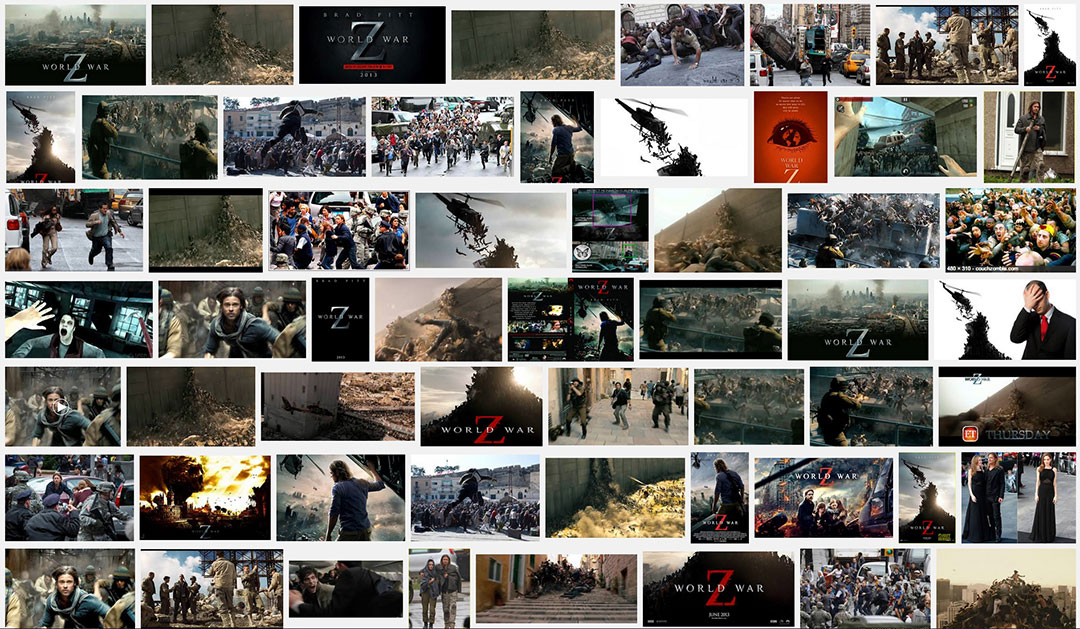
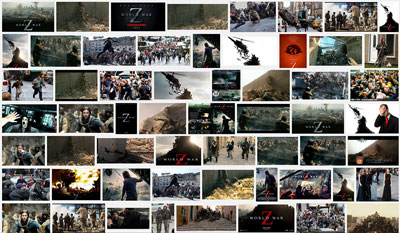
"World War Z" Google image search
In Max Brooks's
World War Z novel, there are no shopping sprees, no gift shop decimations or mall orgies. But unlike
Zone One,
World War Z is a "eucatastopia." Allow me to back into an explanation of that ungainly term slowly, beginning with the end, the part that rhymes with "utopia."
Utopia is a neologism. It was a pun derived from the Greek that simultaneously meant "good/no place." The problem with creating a good/no place is something the first utopian,
Sir Thomas More, understood very well: Utopias requires severing all ties with the past. In More's original 1516
Utopia, this was achieved by digging a wide, deep trench, cutting off what once was once a peninsula to create an island on which a benevolent dictator created the ideal society. In
World War Z, the zombies are the trench. The trench is revolution.
The first story Brooks tells us is of a zombie outbreak that takes place in a nameless village on the outskirts of the Three Gorges Reservoir in China.13 While diving for salvage in the flooded remains of his family's village, a boy is bitten and brings the contagion back to land. Whether or not the boy is a true "patient zero" we never learn for sure. The true origin and exact mechanism of the zombie plague is left obscured by Brooks, but the transformation is slow enough that the threat spreads like a meme and breaks out like a revolution.
David Graeber argues that, "In the wake of a revolution, ideas that had been considered veritably lunatic fringe quickly become the accepted currency of debate." This is the transformation that Brooks's narrative convincingly imagines. Most of us think of revolution as localized events, as discrete political upheavals that can be and are laid out as legible narratives. But Graeber argues that revolutions are a "planetwide transformations of political common sense." Things that might look like they start in a plaza, like Zuccotti Park or Tahrir Square, or in one city, like Boston or Paris, have far broader origins. And while revolutions may seem to culminate on the national or sometimes regional level, they actually don't. Graeber conceives of revolution more widely, as epochal.
"The storming of the Bastille in Paris could well end up having effects on Denmark, or even Egypt, just as profound as on France itself – in some cases, even more so,"
Graeber writes. The "Arab Spring," for example, takes its name from the "European Spring" of 1848, "which saw revolutions break out almost simultaneously in fifty countries." Graeber (and many others) also believes "the Russian Revolution of 1917 was a world revolution ultimately responsible for the New Deal and European welfare states as much as for Soviet communism." He also points out that in the 1968 protests, revolutions and uprising "broke out almost everywhere, from China to Mexico, seized power nowhere, but nonetheless changed everything."
Brooks's phantasmagorical revolution is far grimmer than any revolutionary Terror. Unlike the
WWZ movie, which hinges on a silver bullet, salvation in Brooks's novel relies on an imagined defence strategy he calls the
"Redeker plan." It amounts to a kind of
Sophie's Choice, but on the scale of whole nations, in which hundreds of thousands are sacrificed to save millions.
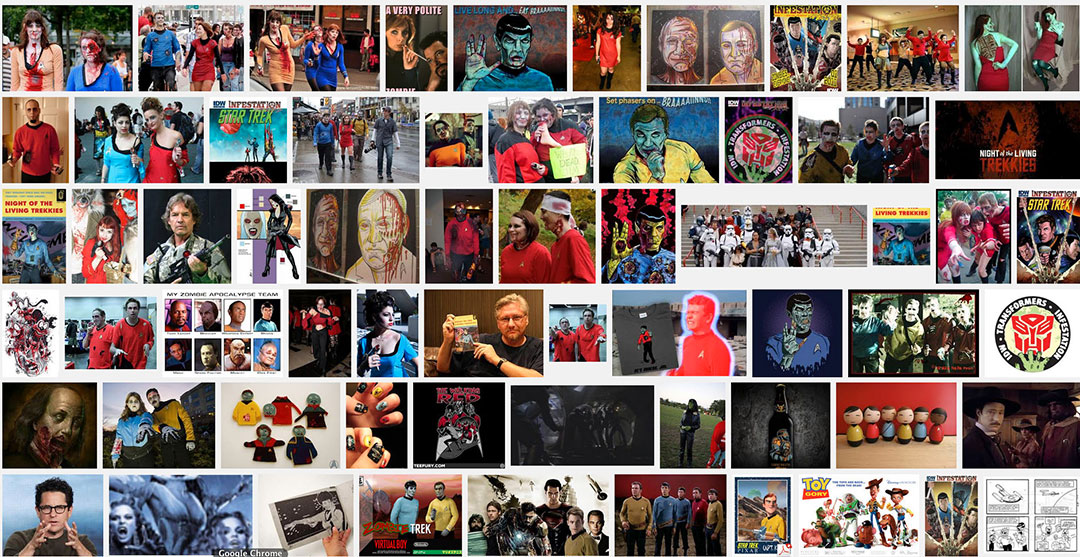
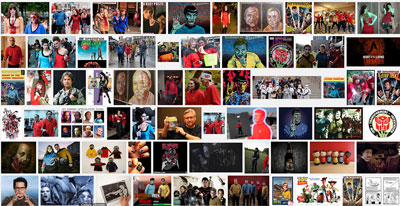
"Star Trek Zombies" Google image search
Zombies in Utopia
The sci-fi author and self-described "accidental utopian"
Kim Stanely Robinson has made a career of trying to imagine utopias. In his latest novel,
2312, he imagines a future in which the Earth is still mired in tradition, hierarchy and inequity, an environmental and economic sinkhole. Meanwhile, throughout the rest of the solar system, a utopian trans-human, non-capitalist society thrives. The book culminates with Robinson imagining a peaceful global revolution sweeping Earth.
2312 is a great book. Robinson is one of my all-time favorite authors, and his imagination of that future revolution is striking in its originality – but it also struck me as upside down. I don't like to think of myself as a doctrinaire thinker, but Robinson's imagined velvet revolution left me uneasy or at least unsatisfied.
2312 tells the story of a revolution literally handed down from above: conceived, planned and then dropped from space on an unsuspecting populace below. As much as I liked the book, I found the way Robinson conceived of revolution to be a disturbingly top-down, almost neoconservative vision.14
To be fair, Robinson is a Northern Californian progressive and set himself a difficult challenge. He was aware that revolutions, as often as not, devolve into violence and thuggery, and he wanted to imagine a peaceful transformation. And Robinson freely admits that realistically imagining how utopias might come about is not easy:
We can't imagine the bridge over the Great Trench, given the world we're in, and the massively entrenched power of the institutions that shape our lives – and the guns that are still there under the table. Indeed right on the table.
Because of anthropogenic climate change, ocean acidification and mass extinction, Robinson argues that "we have come to a moment of utopia or catastrophe. There is no middle ground, mediocrity will no longer succeed. So utopia is no longer a nice idea, but a survival necessity." He believes that utopia's place isn't minor, that it is front and center. "We need meaning to go forward," Robinson writes, "and yet capitalist society doesn't provide it." And according to our accidental utopian, "utopia has gone from being a somewhat minor literary problem to a necessary survival strategy."
Brooks has written a nightmarishly plausible zombie apocalypse, a catastrophe only slightly removed from the nightmare of what we can look forward to in the case of actual societal collapse.15 In this sense, Brooks's phantasmagorical revolution is terrifying, plausible and looming. In the world war against the zombies, he offers an alternative to a system that will yield no alternative. The war itself is Brooks's grim utopia.
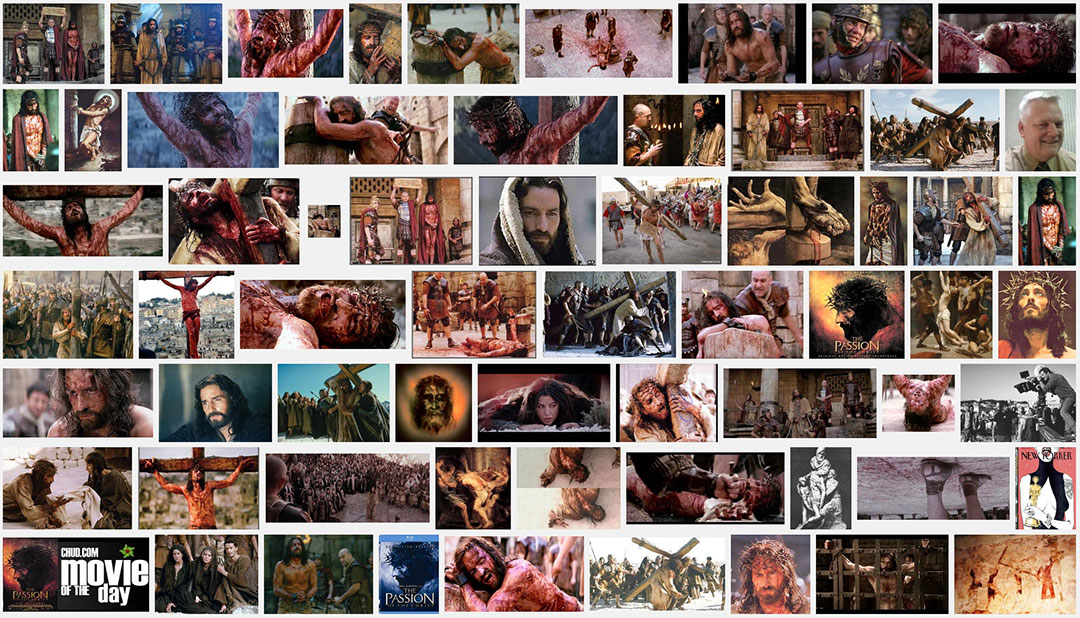
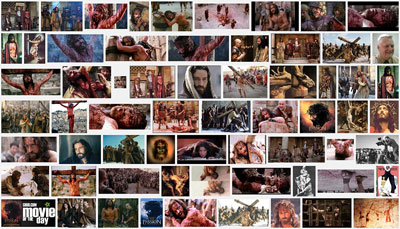
Passion of the Christ" Google image search
Zombies in Eucatastopia
Eucatastrophe is a neologism cooked up by the language scholar and fantasy novelist J. R. R. Tolkien. By affixing the Greek prefix εὖ, which means "good," to catastrophe, he coined the word to mean "the sudden happy turn in a story which pierces you with a joy that brings tears (which I argued it is the highest function of fairy-stories to produce)." Tolkien believed that "the Resurrection was the greatest 'eucatastrophe' possible in the greatest Fairy Story."
I'm confident that Tolkien would not have liked the idea of using the Reign of Terror as an example of the eucatastrophic (partly because he seems too much of a Brit and Anglican to have put the French Revolution alongside the Resurrection), but revolution was the very first thing I thought of when a friend explained the term to me recently. And after reading Max Brooks'
World War Z novel, I can't see zombies as anything but revolution – or, to use Tolkien's word, a eucatastrophe: a sudden turn away from a very plausible doom.
Brooks's novel ends with the world in shambles. The catastrophe has passed over us, and survivors are beginning to rebuild. The whales are gone, the oil fields of Saudi Arabia have been destroyed, a number of nuclear exchanges have taken place, and Lhasa is the most populous city in the world. Throughout the book, Brooks manages to deliver the sort of reversals of fortune we cherish in our catastrophes. At least part of Brooks's project is a global Saturnalia: A thinly disguised
Josh Bolton has been reduced to shoveling shit as part of an effort to develop an experimental biofuel, Cuba has become the world's economic powerhouse, the U.S. authorities have abandoned neoliberalism and have returned to the tools of the New Deal.
In zombies, Brooks was able to imagine something akin to Paul Krugman's
hoped for alien invasion, but on a far greater scale and effect: a threat big enough to trump religious differences, racism and even our current economic ideological fundamentalism. Brooks plausibly imagines the zombies as something the entire modern world – every single man, woman and child on the planet – has a shared experience of.
The science fiction author William Gibson famously noted that, "The future is already here – it's just not evenly distributed." In
WWZ, Brooks has imagined a future that is finally, at long last, evenly distributed. "Anywhere around the world, anyone you talk to, all of us have a powerful shared experience," Brooks has one of his characters explain. "And even though the details are different, the stories themselves are pretty much the same."
I would like to believe that neoiberalism won't end in a catastrophic collapse and global dieback. I'd like to believe that utopia can come about by means of peaceful protest or enlightened deliberation by democratically elected bodies. I believe Kim Stanley Robinson is right, that "utopia has gone from being a somewhat minor literary problem to a necessary survival strategy." But I think the choice Robinson gives, of "utopia or catastrophe" is a false one. We are past the time when utopians can shy away from the catastrophic. Catastrophe is the trench beyond which utopia lays.
When I visited Zuccotti Park, I saw a lot of people like myself. I am not an anarchist, a revolutionary or even much of an anti-capitalist, but I am a lot like the Medieval peasant who "would have burst but for his hope in the Devil." That might be why so many of us have gone from avoiding zombie movies to becoming passive consumers and on to the state I am in now, call it "anti-anti-zombie." I imagine that, like me, this anti-anti-zombie audiences was left cold by Brad Pitt's
World War Z because they're not looking for a messianic figure to save the system from catastrophe, but that instead, they had hoped to see the lay of the land on the far side of the good catastrophe.
Zombies started their life in the Hollywood of the 1930s and ‘40s as simplistic stand-ins for racist xenophobia. Post-millennial zombies have been hot-rodded by Danny Boyle and made into a subversive form of utopia. That grim utopianism was globalized by Max Brooks, and now Brad Pitt and his partners are working to transform it into a global franchise. But if zombies are to stay relevant, it will rely on the shambling monsters' ability to stay subversive – and real subversive shocks and terror are not dystopian. They are utopian.

















